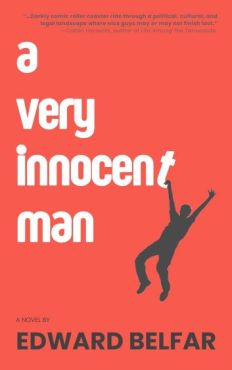Edward Belfar is the author of the novel A Very Innocent Man (Flexible Press, 2023) and the short-story collection Wanderers (Stephen F. Austin State University Press, 2012). One of the stories in the Wanderers was chosen as the winning entry in the Sport Literature Association’s fiction competition, while another was nominated for a Pushcart Prize. His fiction and essays have appeared in numerous literary journals, including Shenandoah, The Baltimore Review, Potpourri, Confrontation, Natural Bridge, Schuylkill Valley Journal, and Tampa Review. As a reader for the journal The Plentitudes, he reviews both fiction and nonfiction submissions. He earned his BA in history and MA in creative writing at the State University of New York at Stony Brook and his PhD in literature at Temple University. He lives with his wife in Maryland and can be reached through his website at www.edwardbelfar.com.
Mike Maggio: What was the impetus for writing A Very Innocent Man? What made you want to write a novel about someone who is part of the medical addiction problem in today’s society?
Edward Belfar: This question has come up a lot since the publication of A Very Innocent Man. When spending time with pharmacists—which I did at one point because my wife worked in that field—one hears many stories about how substance-abusing patients and the unscrupulous health care professionals who feed their addictions both try to game the system. Those stories fascinated me, and I began to read up on the subject. I found many moving and disturbing articles on the toll opioid addiction took on individuals, families, and communities, but stories about the suppliers, the doctors who ran the pill mills often amounted to little more than brief summaries of charges and legal proceedings. I became increasingly curious about what had led those physicians not only to ignore the oaths they took not to harm their patients but to risk so much: their reputations, their livelihoods, their freedom. Was their opioid peddling so remunerative as to justify taking those risks? Did they also derive some less quantifiable pleasures—thrills, perhaps?—from their lawbreaking? Out of those musings arose the tale of Dr. Robert Rosen.
MM: Rosen, the main character, is obviously not a very innocent man. In fact, he is anything but. Why did you choose this title?
EB: The title comes from a scene in which a television reporter accosts Dr. Rosen as he leaves the courthouse following his arrest for trafficking in opioid prescriptions. Asked to comment, he answers as one would expect of a person given to hyperbole and bluster and immune to shame: “I’m innocent. I’m very innocent.” Fantastical as that claim may seem, no legal judgment can shake his belief in his own moral innocence.
MM: There is nothing very redeeming about Dr. Rosen. He is a charlatan who is out for himself and tries to take advantage of everyone around him including, unsuccessfully, his mother. And yet the reader, at times, takes his side. Why?
EB: I think that most readers view him not as a monster, a force of implacable evil, but as a very flawed human being. The qualities that lead him astray—hubris, greed, lust, spitefulness—are those we recognize in ourselves, even if we do not allow them to dictate our actions as readily as Dr. Rosen does his. At times, he shows a limited capacity for self-awareness. In his most vulnerable moments, he even experiences something approximating remorse and vows to change his life for the better. Of course, as soon as the dark times pass, he forgets the resolutions he made and goes on living as before, as people so often do.
MM: There is a political undertone running throughout the novel that is very much related to the Trump years. And yet this is not an explicitly political book. What was your reason to include this political allusion in the novel?
EB: Though not, as you point out, explicitly political, the novel is very much about the cultural influence of Donald Trump. Over the past eight years, behavior once viewed as grotesque has become acceptable and even praiseworthy in the view of many, and American life has become coarser, meaner, and uglier. Who better exemplifies the spirit of the age than the shameless Dr. Robert Rosen, the corrupt healer who enriches himself by harming others?
MM: Your previous publication, Wanderers, is a collection of short stories, many of which take place in Kenya. The stories and themes are quite different from those in A Very Innocent Man. How do you choose the things you write about? What inspires you?
EB: Kenya provided much of the inspiration for Wanderers. My wife, Kathleen, is a native of that country, and we have visited it together several times. It is a country of extremes: on the one hand, great natural beauty and warm, kind people, and on the other, decaying or inadequate infrastructure, pervasive crime and corruption, and ethnic divisions that sometimes lead to violence. Kathleen, a naturalized American citizen, had been away from Kenya for over a decade prior to our first visit together in 2002, and that trip in particular proved bittersweet for her. Despite the joyous welcome we received from her family and friends, the Kenya to which she had returned appeared to her as a broken and demoralized country, one she barely recognized, one that at times reduced her to tears. That sense of loss—whether of a home, a loved one, a position in life—and disorientation pervades the stories in Wanderers, even those not set in Kenya.
While Wanderers focuses on fraught moments in the lives of individuals, the satirical A Very Innocent Man presents a panoramic view of America in the Trump era. Though the novel also depicts loss in its various permutations, I think its primary animating force is anger. That may seem counterintuitive, given the overall comic tone. As I have learned from such writers as Mikhail Bulgakov, Evelyn Waugh, Joseph Roth, Joseph Heller, Flannery O’Connor, and Walker Percy, however, anger is often best expressed in fiction indirectly, through mockery. America in the second decade of the twenty-first century offers no shortage of targets deserving of ridicule: opioid-peddling doctors, corrupt politicians, telemarketing scammers, and self-help charlatans. A Very Innocent Man takes aim at all of those and numerous others.
MM: What are you working on now?
EB: I have been revising a couple of old, unpublished stories to see if I can salvage them. I also have been doing some preliminary research on what I hope may eventually develop into a historical novel. To this point, I have set all my published fiction in the present or very recent past. After A Very Innocent Man, a novel bound firmly to our present moment, the possibility of escaping the tyranny of today’s headlines by setting a narrative in a different era intrigues me.
Mike Maggio’s publication credits include fiction, poetry, travel and reviews in many local, national and international publications including Potomac Review, The L.A. Weekly, The Washington CityPaper, and The Washington Independent Review of Books. His full-length publications include a novel, The Wizard and the White House (Little Feather Books, 2014), a novella, The Appointment (Vine Leaves Press, 2017), and a collection of short stories, Letters from Inside (Vine Leaves Press, 2019). His latest collection of poetry, Let’s Call It Paradise, was released by San Francisco Bay Press in 2022 and was awarded the International Book Award for contemporary poetry.. His web site is www.mikemaggio.net.


Pingback: An Interview with Edward Belfar - Mike Maggio·